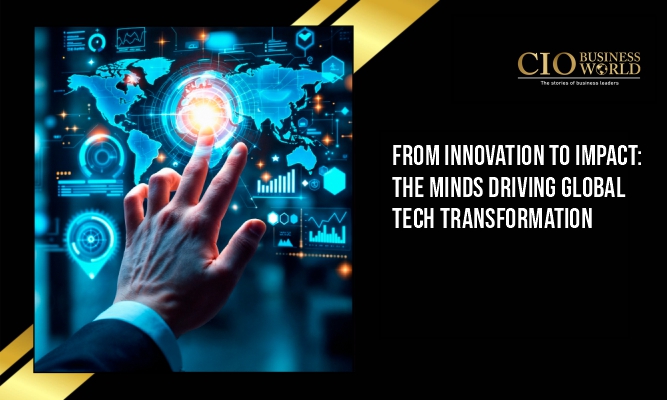Technology has always been a catalyst for progress, but in the last decade, the pace of change has been unprecedented. What once seemed futuristic—artificial intelligence, blockchain, quantum computing, immersive realities—has moved from experimental labs to mainstream industries. Yet, the true force behind this transformation is not just technology itself but the leaders, innovators, and visionaries who guide it from concept to real-world impact.
The Shift from Innovation to Impact
Innovation alone is no longer enough. Organizations across the globe are realizing that disruptive ideas, while exciting, must be translated into measurable value. The digital age has shifted the emphasis from simply creating cutting-edge solutions to ensuring they solve pressing problems, improve efficiency, and enhance human lives.
This transition from innovation to impact requires more than technical brilliance—it demands leadership, foresight, and the courage to challenge conventional thinking. The individuals driving global tech transformation are not just engineers or entrepreneurs; they are change-makers who combine creativity with strategy, technology with empathy, and vision with execution.
The Architects of Transformation
At the heart of this movement are leaders who understand that true transformation is multidimensional. They are shaping the future across several critical areas:
- Artificial Intelligence and Automation
Innovators are reimagining industries with AI and automation, from healthcare diagnostics that detect diseases earlier to financial platforms that predict risks with unprecedented accuracy. These leaders see AI not as a replacement for human ingenuity but as a partner—augmenting decision-making, speeding up innovation cycles, and freeing people from repetitive tasks to focus on higher-value work. - Cybersecurity and Trust
As technology becomes deeply embedded in society, digital trust has emerged as a cornerstone of progress. Visionaries in this field are not only building stronger defenses against cyber threats but also redefining trust through transparency, accountability, and ethics. By weaving security into the fabric of innovation, they ensure that progress is sustainable and resilient. - Connectivity and Inclusion
The digital divide remains a challenge, with billions still lacking reliable internet access. Leaders driving global transformation are tackling this head-on—building infrastructure, harnessing satellite networks, and designing affordable digital tools to ensure no one is left behind. By making connectivity universal, they transform technology into a true equalizer, expanding opportunities for education, healthcare, and commerce. - Sustainability through Technology
Today’s innovators recognize that technology must not only generate economic value but also contribute to environmental sustainability. From green data centers and energy-efficient chips to smart grids and carbon-tracking platforms, leaders are embedding sustainability into their strategies. They see technology as a tool for climate resilience, helping industries balance growth with responsibility. - Human-Centered Design
The most impactful technologies are those designed around people, not just processes. Visionaries are reshaping digital experiences to be intuitive, inclusive, and adaptive. Whether through accessible apps, personalized services, or immersive training platforms, they ensure that technology empowers rather than overwhelms.
The Traits of Visionary Tech Leaders
The minds driving this global transformation share certain qualities that set them apart:
- Vision Beyond the Horizon: They see possibilities where others see barriers. They anticipate the ripple effects of innovation and prepare organizations for long-term change rather than short-term gains.
- Agility and Adaptability: In a world where disruption is constant, they embrace flexibility. They pivot strategies quickly, adopt new technologies rapidly, and encourage experimentation without fear of failure.
- Collaboration and Inclusivity: Transformation is rarely the result of a lone genius. These leaders foster ecosystems of collaboration—bridging startups, corporations, governments, and academia to co-create solutions that benefit society at large.
- Ethics and Responsibility: As digital technologies reshape societies, leaders understand their duty to uphold fairness, transparency, and accountability. They address biases in AI, champion responsible innovation, and embed ethical frameworks into every stage of development.
- Empathy and Human Connection: Above all, they never lose sight of the human element. They recognize that technology’s true purpose is to improve lives, and they lead with empathy to ensure progress is inclusive and humane.
From Boardrooms to Global Stages
Global tech transformation is not confined to Silicon Valley or traditional innovation hubs. It is unfolding in diverse settings: in hospitals using AI to personalize treatment plans, in classrooms delivering immersive virtual education, in factories adopting robotics for safer and more efficient production, and in governments designing digital services that enhance citizen trust.
Leaders are also stepping onto global stages to shape the conversation around the future of technology. They advocate for ethical AI, responsible data use, and international cooperation on digital governance. Their voices influence not just businesses but also policies, standards, and cultural attitudes toward technology.
Turning Challenges into Catalysts
What makes these leaders extraordinary is their ability to transform challenges into catalysts for growth. Data privacy concerns spark new frameworks for transparency. Cybersecurity threats drive innovation in resilience. Climate pressures inspire clean-tech breakthroughs. Instead of viewing obstacles as roadblocks, they see them as opportunities to rethink, reimagine, and rebuild.
The Road Ahead
The journey from innovation to impact is far from complete. Emerging technologies like quantum computing, advanced robotics, and synthetic biology promise even greater transformations in the years ahead. The challenge for leaders will be to guide these breakthroughs responsibly—ensuring they create broad value without deepening inequalities or compromising trust.
What is clear is that the future will not be shaped by technology alone, but by the people who envision, design, and implement it. The true measure of global tech transformation lies not in how advanced our tools become, but in how effectively they solve real-world problems and uplift human potential.
Conclusion
Innovation is the spark, but impact is the flame that lights the path forward. The leaders driving global tech transformation embody this principle by bridging creativity with responsibility, progress with inclusivity, and ambition with purpose.
As the digital era unfolds, their work reminds us that technology is not just about faster machines or smarter algorithms—it is about building a more connected, equitable, and sustainable world. The greatest minds of our time are proving that when innovation is guided by vision and humanity, its impact is limitless.









